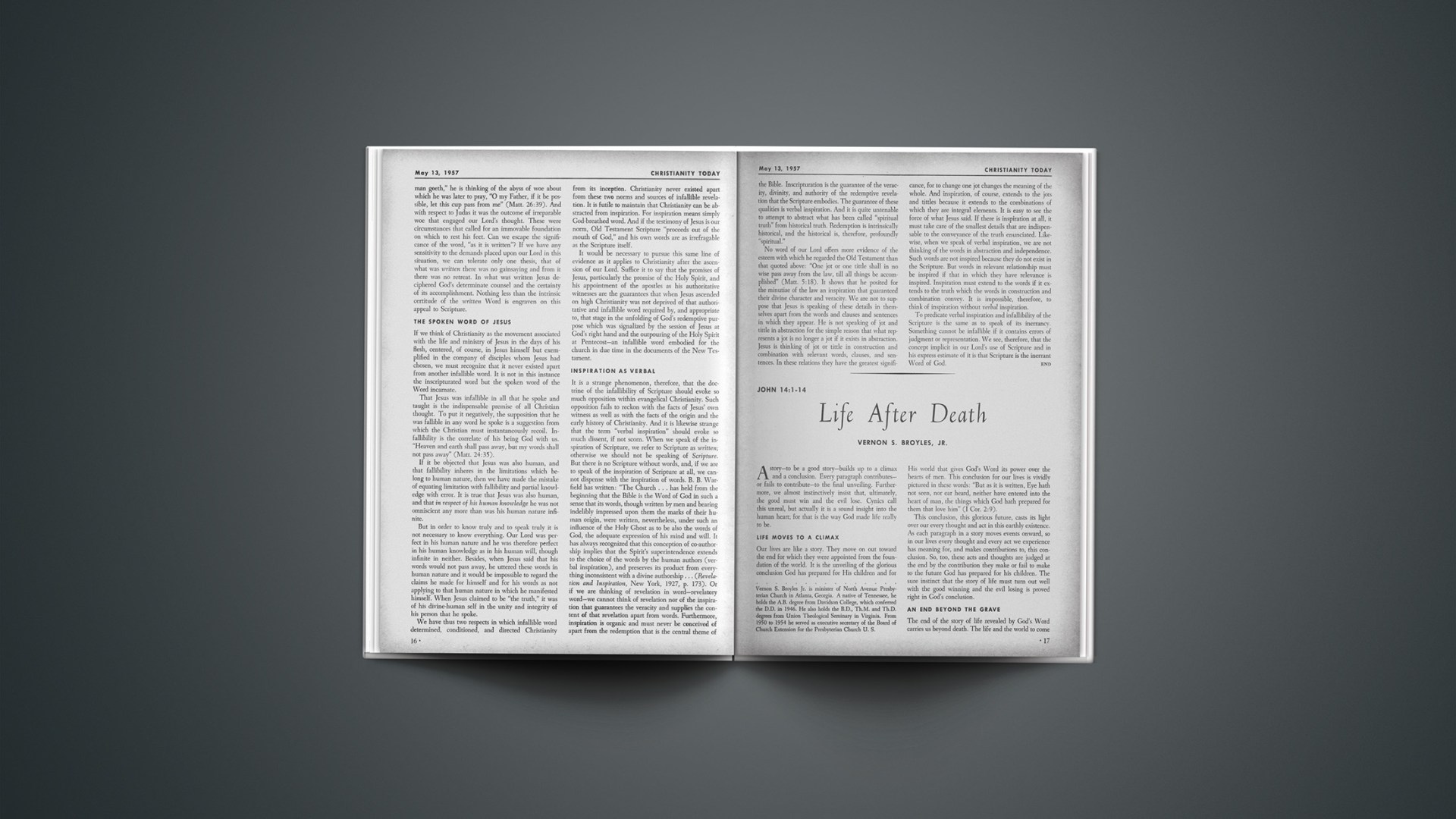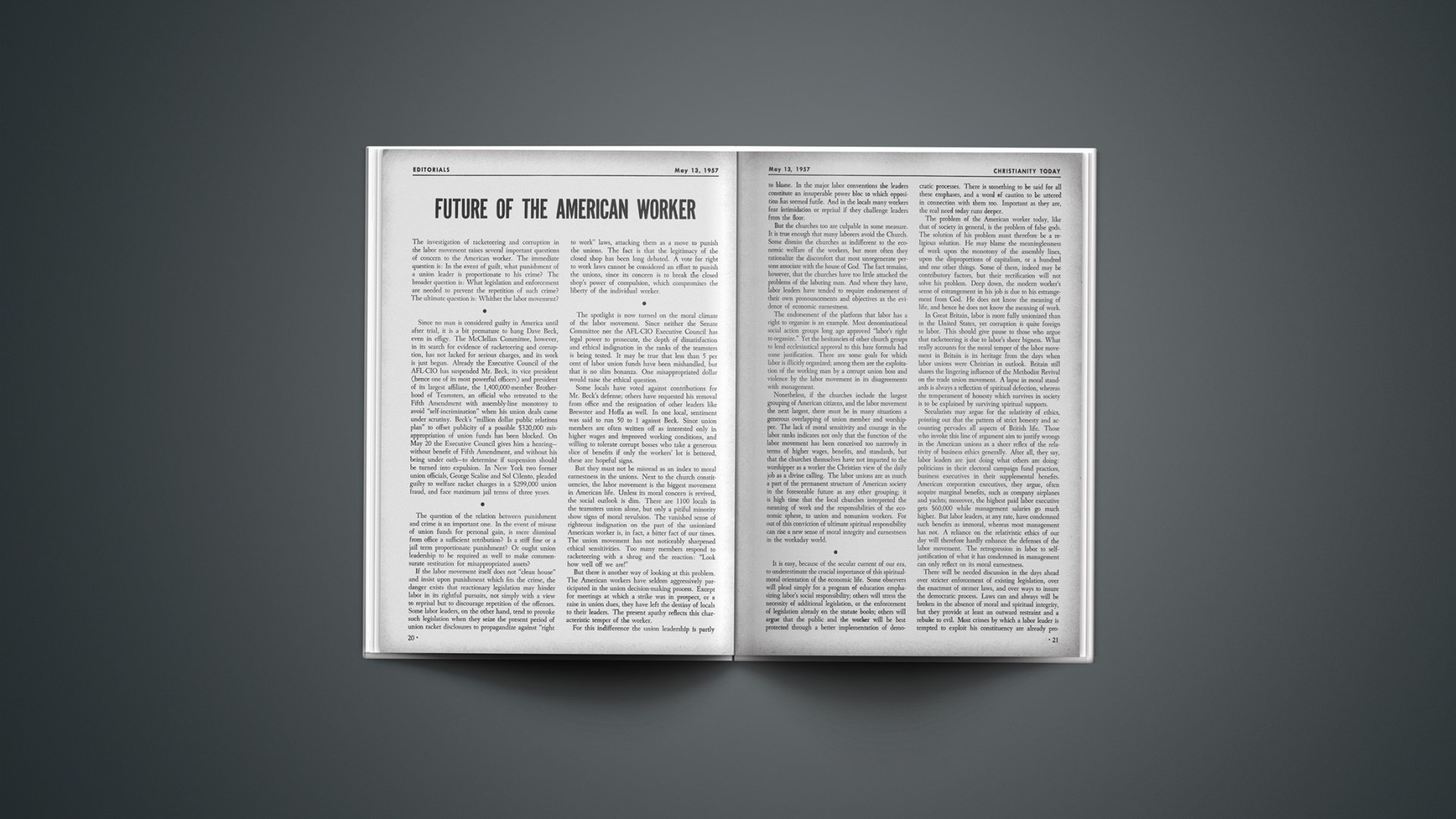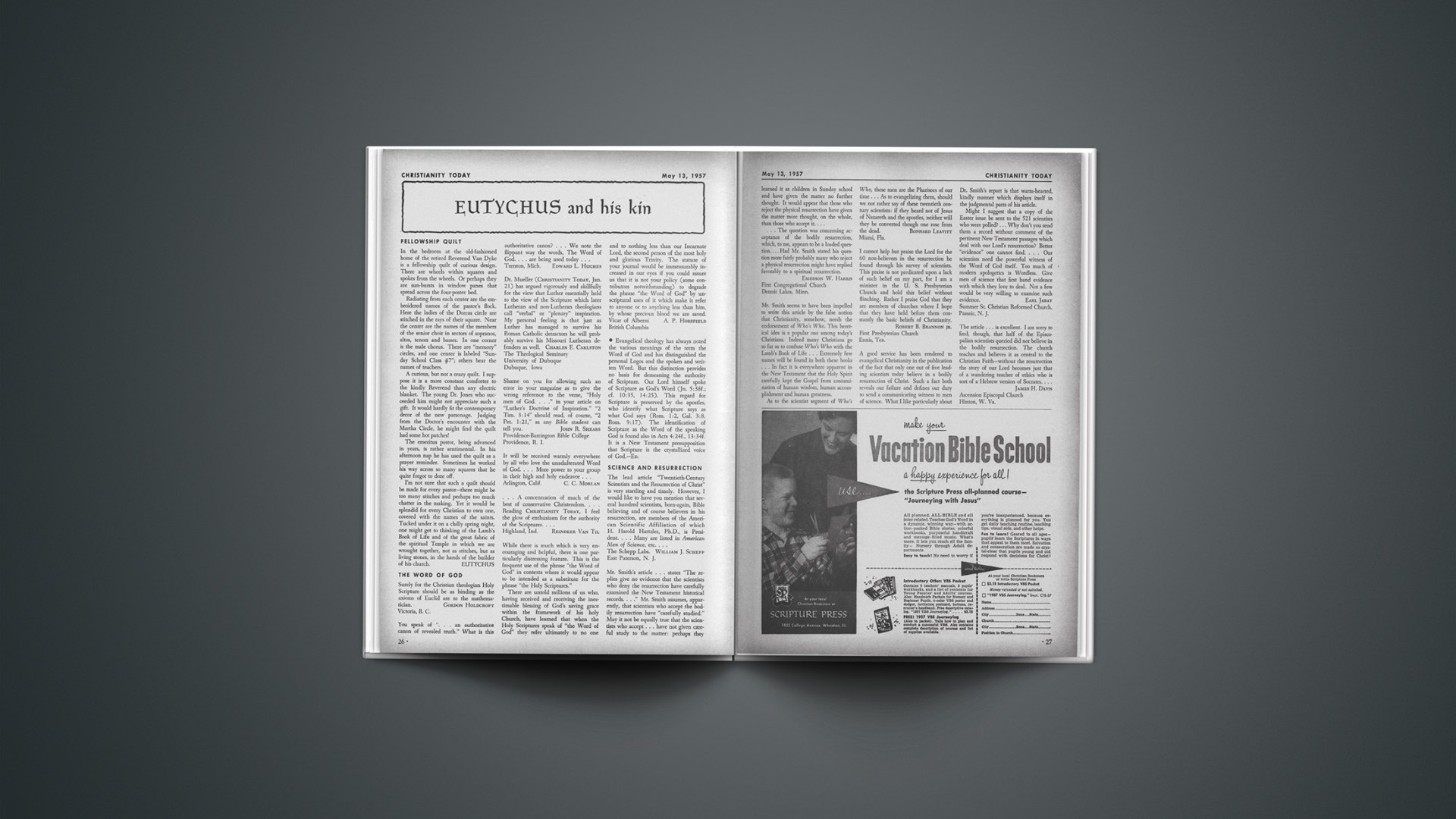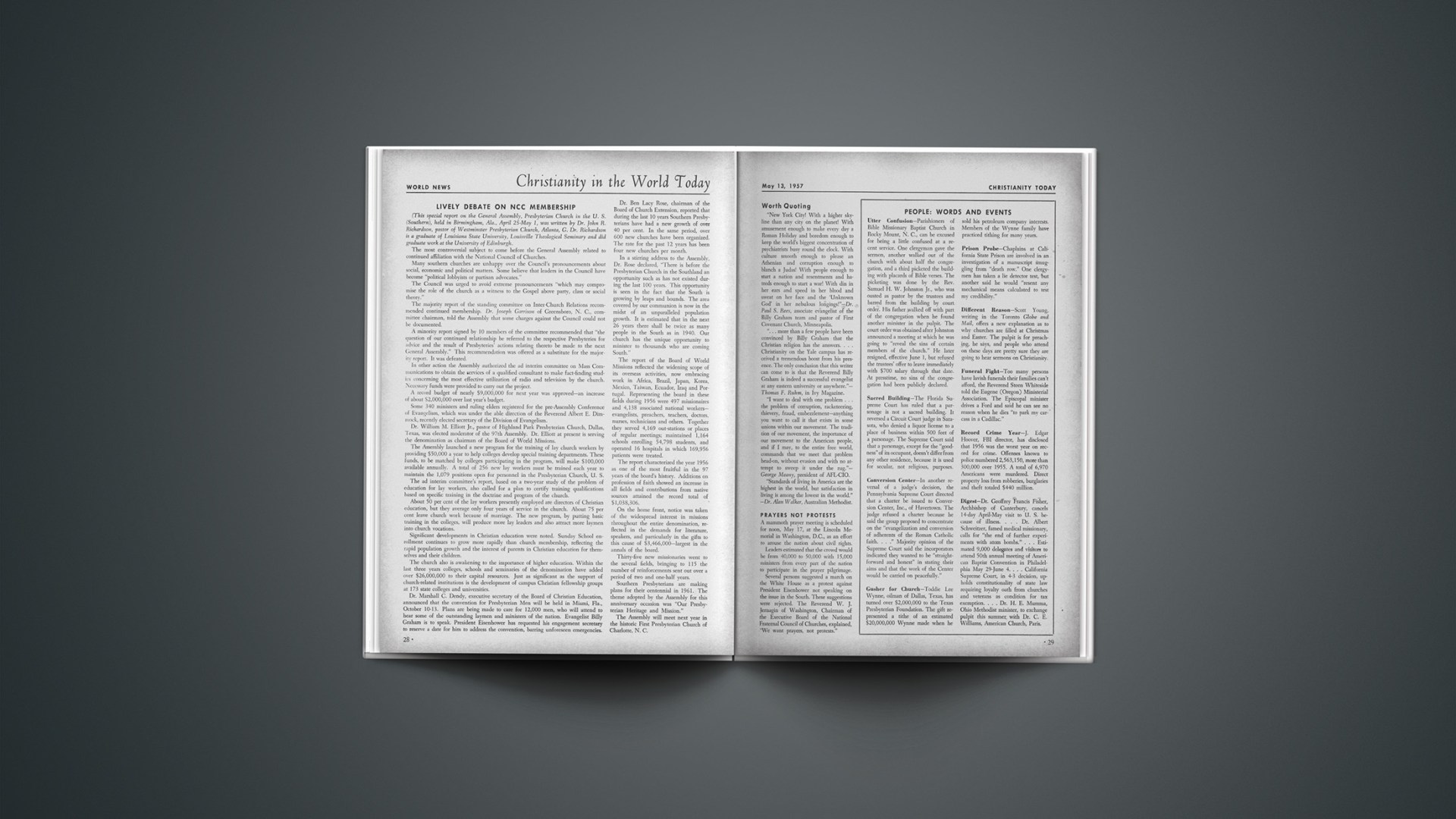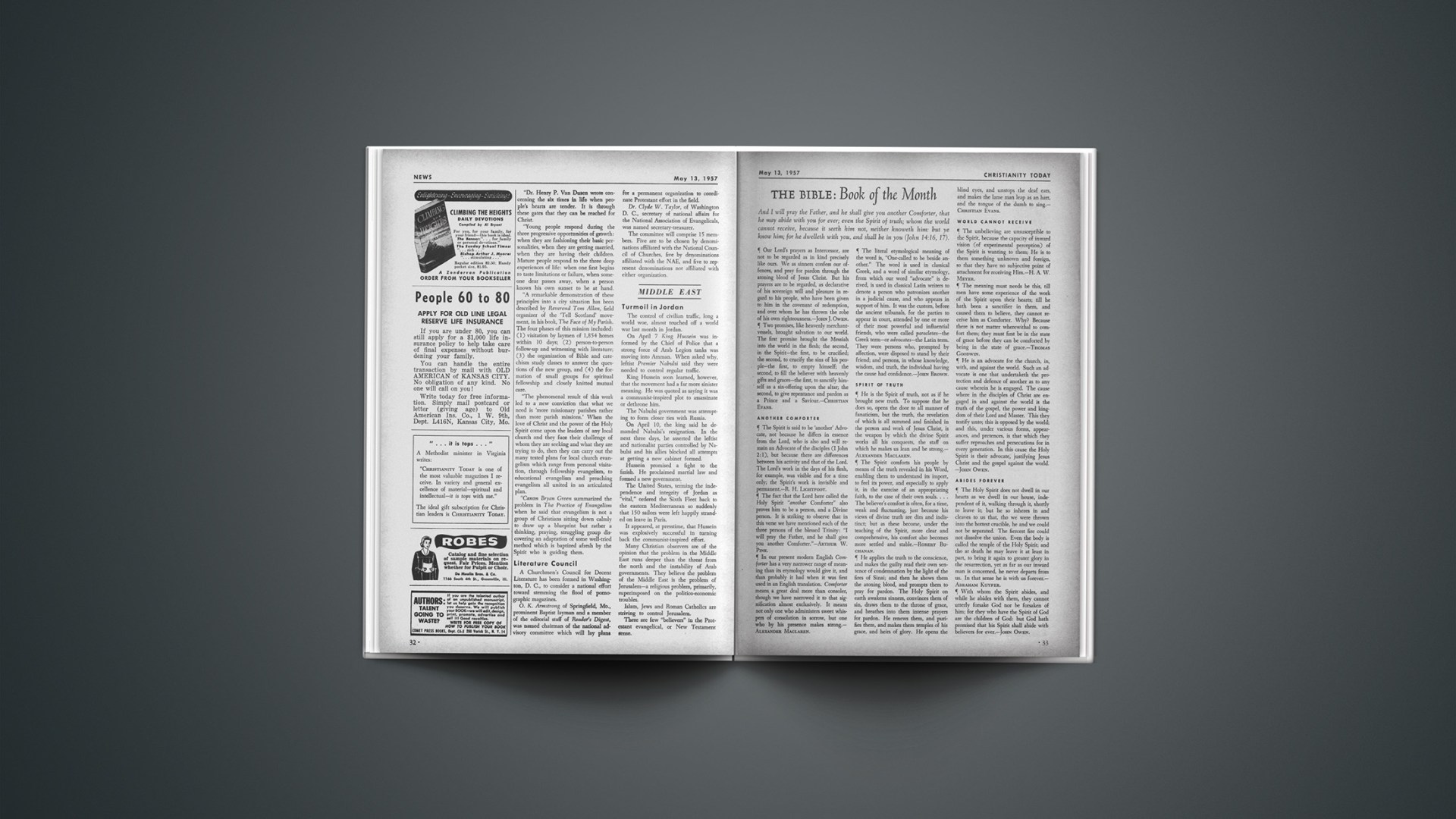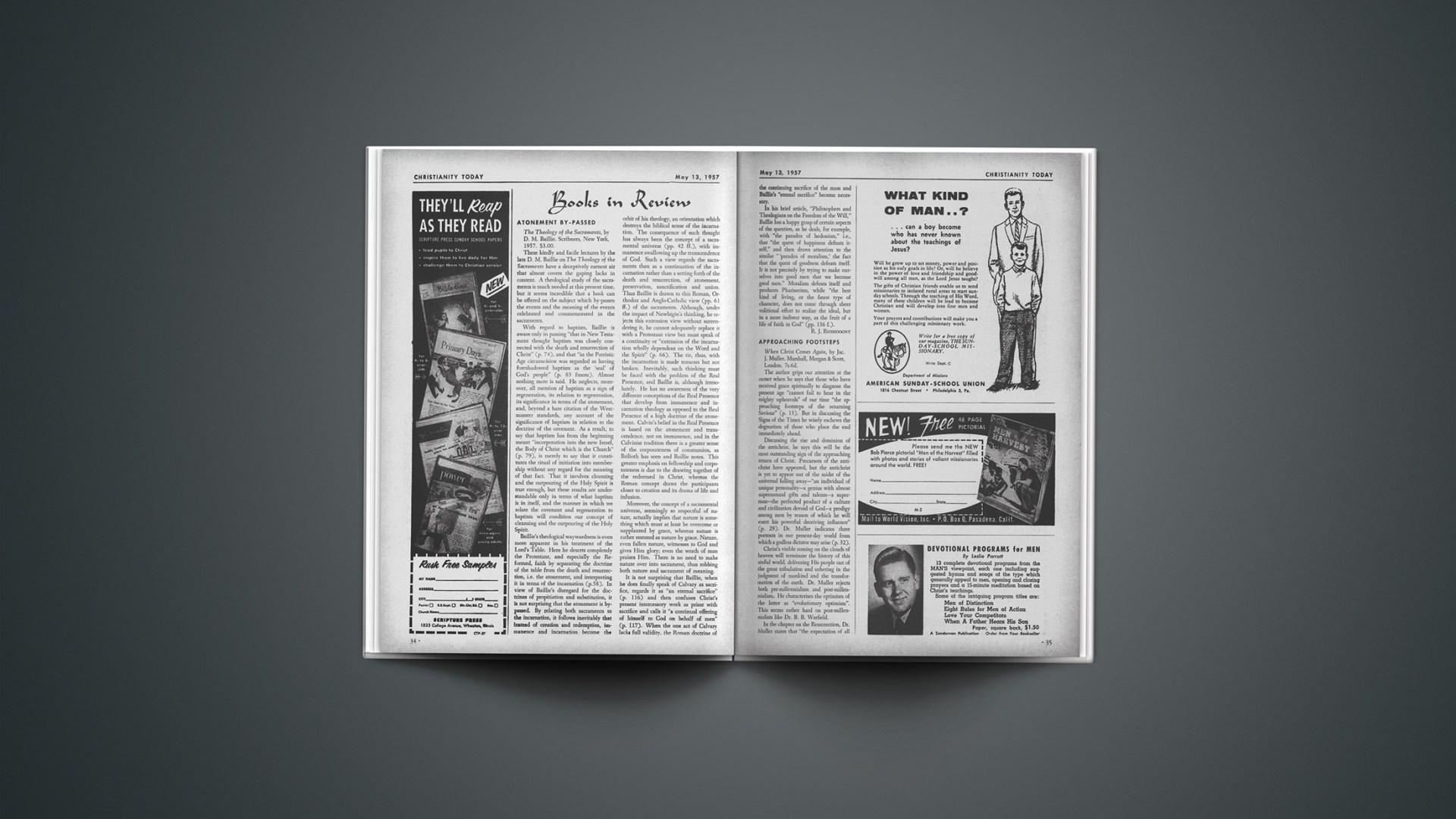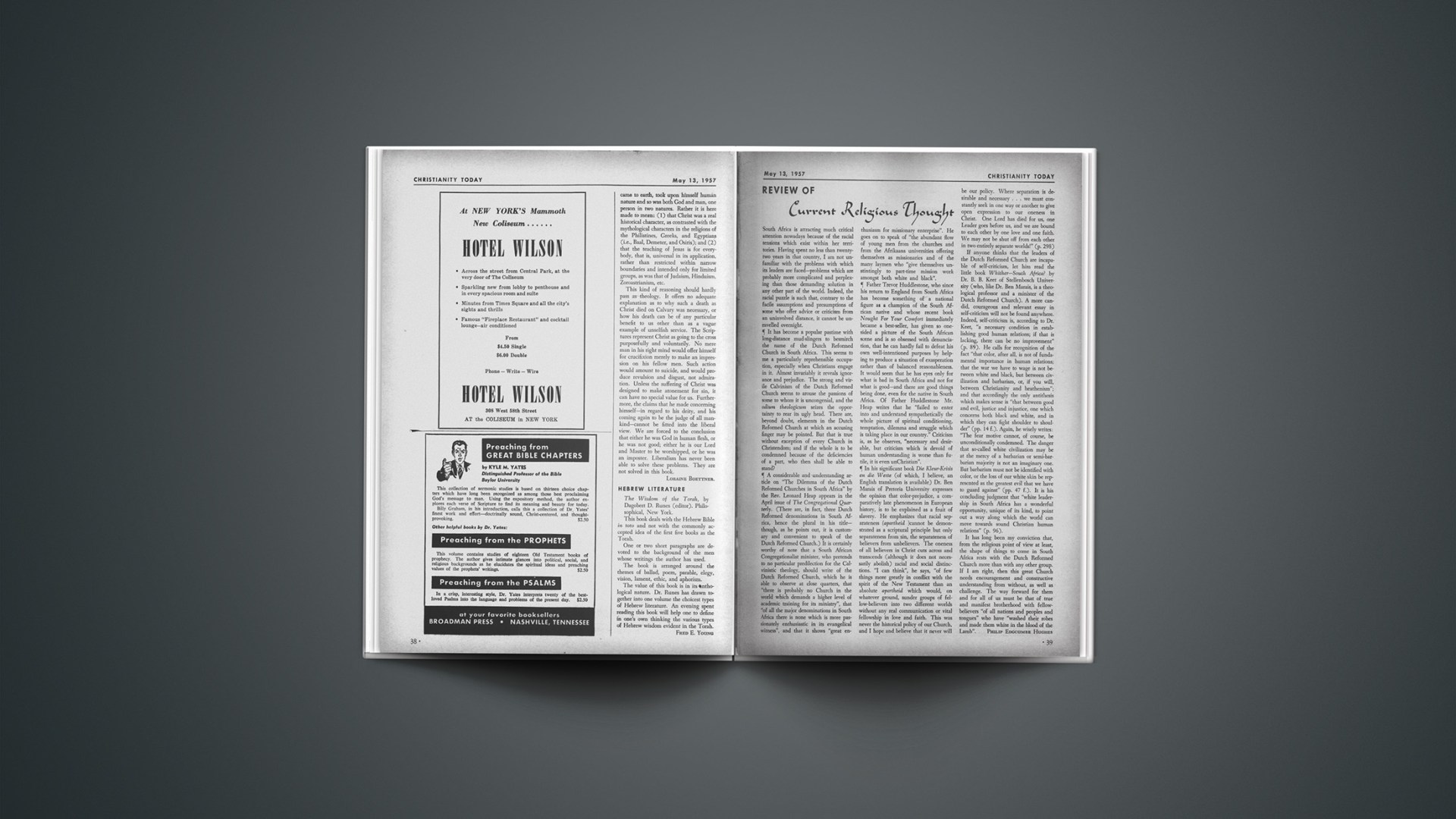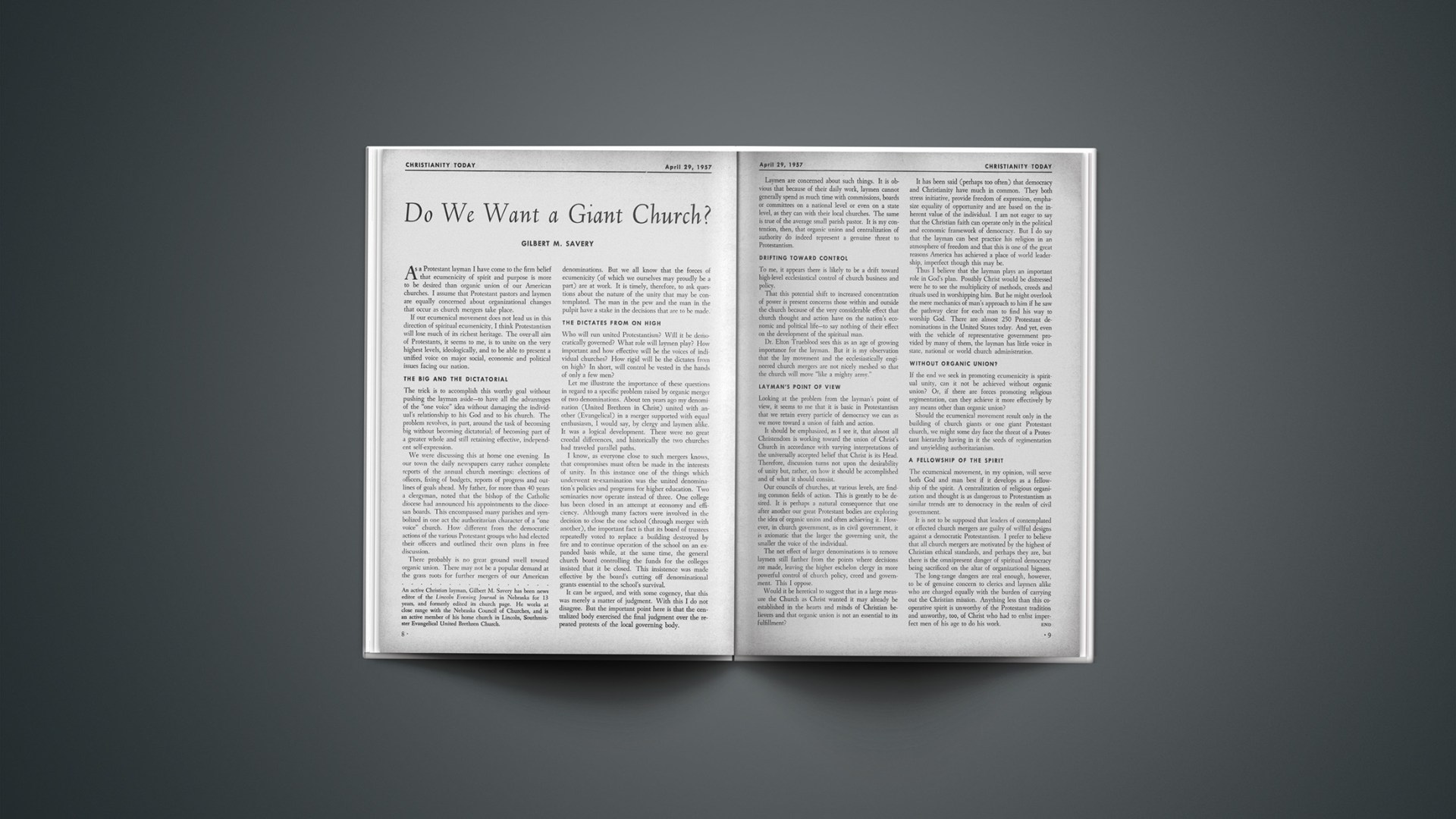A story—to be a good story—builds up to a climax and a conclusion. Every paragraph contributes—or fails to contribute—to the final unveiling. Furthermore, we almost instinctively insist that, ultimately, the good must win and the evil lose. Cynics call this unreal, but actually it is a sound insight into the human heart; for that is the way God made life really to be.
Life Moves To A Climax
Our lives are like a story. They move on out toward the end for which they were appointed from the foundation of the world. It is the unveiling of the glorious conclusion God has prepared for His children and for His world that gives God’s Word its power over the hearts of men. This conclusion for our lives is vividly pictured in these words: “But as it is written, Eye hath not seen, nor ear heard, neither have entered into the heart of man, the things which God hath prepared for them that love him” (1 Cor. 2:9).
This conclusion, this glorious future, casts its light over our every thought and act in this earthly existence. As each paragraph in a story moves events onward, so in our lives every thought and every act we experience has meaning for, and makes contributions to, this conclusion. So, too, these acts and thoughts are judged at the end by the contribution they make or fail to make to the future God has prepared for his children. The sure instinct that the story of life must turn out well with the good winning and the evil losing is proved right in God’s conclusion.
An End Beyond The Grave
The end of the story of life revealed by God’s Word carries us beyond death. The life and the world to come constitute the conclusion of our story and bring us into the field of eschatology—the doctrine of the last things. Here there is mystery; here we are given so few details that our finite minds must indeed bow before the infinite mind and heart of God. We need to walk humbly and to acknowledge that there are many things we cannot understand in our lives on earth. It is only in heaven that we shall know as we are known. We walk literally by faith and not by sight—“Now faith is the substance of things hoped for, the evidence of things not seen” (Heb. 11:1).
But certain lines of the conclusion of our life story we can read, since God has revealed to us those things necessary to answer the questions we need to have answered. Let us fix our minds on certain revealed facts about life after death.
Death is not the end of being—either to saint or sinner. It cannot be, since morally, intellectually and spiritually, man’s incomplete development here demands a future for completion. In every culture and in every civilization since the dawn of history, man has felt there must be a continuation of life for the righting of earth’s wrongs. Egyptians called their caskets “chests of the living.” The German poet Goethe said that one of the weightiest arguments for the future life is that we cannot do without it.
The Teaching Of Christ
But it was to the heart of man, prepared by God’s Spirit, that God spoke his clear word in the life and death and resurrection of Jesus Christ. In time of stress we are neither good at understanding argument nor balancing probabilities, but the simple, direct word of Christ lifts us up and assures our hearts: “In my Father’s house are many mansions: if it were not so, I would have told you. I go to prepare a place for you. And if I go and prepare a place for you, I will come again, and receive you unto myself; that where I am, there ye may be also” (John 14:2, 3).
The One Who Came Back
In Christ we find our proof that life continues after death, the kind of proof that convinces the heart and comforts the mind. Christian faith offers not a theory, not an illusion, but a fact of history as proof of its Gospel. Nothing could be clearer, simpler, more convincing, or more definite. A man once said to me it was hard to believe in life after death because no one has ever come back. Here is where Christianity meets the need of the human heart for assurance. God offers to you and to all men one who did come back from the grave.
Here is no debate but a demonstration. Let it be said again that Christianity rests its whole case not upon what will happen or what might happen, but upon what has happened on this hard-rock earth. We want eternal life for many reasons, and God’s resurrection of Jesus assures us of obtaining it. Paul knew this was the crux of the whole matter when he said: “And if Christ be not raised, your faith is vain; ye are yet in your sins. Then they also which are fallen asleep in Christ are perished. If in this life only we have hope in Christ, we are of all men most miserable” (1 Cor. 15:17–19).
Doom Of Evil Is Sure
In the resurrection of Jesus Christ from the dead we reach the climax of our life story, and one of the surest instincts of the human heart finds its proof—the good must win, the evil lose.
Jesus Christ, having died, came back leading death captive. Because he came back and lives, those who accept him will also live with him, and those who reject him also will live without him. His life and death, his teaching and example, the fact of his revelation of God, all these culminate in the one clear, simple, convincing and definite fact: he is risen.
Comfort In The Valley
This fact needs to have added to it our glad acceptance. And usually this glad acceptance comes most completely in the valley of sorrow. Christ came to glory through suffering and death. He is the way, and suffering is often in God’s providence the pathway to glory. Today God’s heaven is more real and more precious to those who see it from the valley of the shadow of death: “… if so be that we suffer with him, that we may be also glorified together” (Rom. 8:17).
To those who in sorrow seek assurance of life beyond death—not proof, but assurance—look “… unto Jesus, the author and finisher of our faith; who for the joy that was set before him endured the cross, despising the shame, and is set down at the right hand of the throne of God” (Heb. 12:2).
Read about, think about his resurrection and repeat over and over his promises of life in and through himself. You will find fears receding and confidence and assurance growing. Conviction will form as the dominant note of your soul.
Dividing Of The Ways
As you follow Christ and the writers of the New Testament, your heart finds certain answers to this question about life after death. What do we really know of it?
First, it is clear that there is in this life a dividing of the ways which lead after death to two separate destinations—heaven and hell, life with God and life without God. In him who is our assurance of life after death we have not only the glorious promise of heaven but also the dark picture of hell.
Nowhere is the contrast more direct than in the teaching of Jesus himself. Everyone, says Jesus, will have life after death, but some will go to heaven and some will go to hell.
Christ At The Crossroads
Second, God’s word makes it simple and clear that this dividing of the ways—one to heaven and one to hell—is at the point where Jesus Christ stands. Your life after death depends upon your personal decision here on earth concerning Jesus Christ—eternity depends on your choice or rejection of Jesus Christ as the son of God and as your Lord and Master. You cannot occupy Christ’s mansions in the father’s house without Christ. The only way you can go to the Christian’s heaven is by the Christian’s Christ. This sounds simple enough, but men and women everywhere take for granted that they will slip in somehow.
Christ has made this clear and convincing in the following passages:
He that believeth on him is not condemned: but he that believeth not is condemned already, because he hath not believed in the name of the only begotten Son of God (John 3:18).
And:
He that believeth on the Son hath everlasting life: and he that believeth not the Son shall not see life; but the wrath of God abideth on him (John 3:36).
And finally:
Whosoever therefore shall confess me before men, him will I confess also before my Father which is in heaven. But whosoever shall deny me before men, him will I also deny before my Father which is in heaven (Matt. 10:32, 33).
From this we see that the most awe-inspiring gift God gave to man was his power of choice, with all eternity dependent on whether he chooses or rejects God in Jesus Christ. You don’t earn heaven by your merit. Heaven is in no sense a reward for your good deeds. It is a reward only for your faith, your choice of God.
Continuity Of Identity
Third, we find the assurance that we shall live in the world to come as the same persons we are now. Identity shall be preserved and we shall know one another. Jesus Christ made it manifest that people would and did live after the experience of death. Death to him was not a major defeat but an experience whereby he could “deliver them who through fear of death were all their lifetime subject to bondage” (Heb. 2:15).
Jesus Christ never argued the future life. He spoke of it as an existence where people were dealt with on the basis of their experience here. On the Mount of Transfiguration he met and talked with Moses and Elijah. He told of Dives and Lazarus, conscious of one another after death, conscious of the gulf separating them, conscious of the reasons for the gulf. At the grave of Lazarus, brother of Mary and Martha, he turned to them and said with definite conviction: “I am the resurrection, and the life: he that believeth in me, though he were dead, yet shall he live; and whosoever liveth and believeth in me shall never die. Believest thou this?” (John 11:25, 26).
Again, he told the thief on the cross that he would be with him that day in Paradise. Thus God teaches us that death does not rob us of our individual identity, nor does it take from us our experience here, as His words tell us:
But I say unto you, That every idle word that men shall speak, they shall give account thereof in the day of judgment. For by thy words thou shalt be justified, and by thy words thou shalt be condemned (Matt. 12:36, 37).
And:
For we must all appear before the judgment seat of Christ; that every one may receive the things done in his body, according to that he hath done, whether it be good or bad (2 Cor. 5:10).
All of this simply means that after death we are changed, but the change preserves our personal and social identity. We are still the possessors of our earthly experiences. All of them will be a part of us. The forgotten and the remembered will be there, the good and the bad. The environment will be the truth, the beauty, and its goodness of God, but we will be ourselves and will be with those we know. We shall be alive in a world with which we are familiar.
Of course, there are unanswered questions here. But we must not let the unanswered questions hide the fact that many questions are answered. Christ reveals clearly and definitely that we move through death into the life after death as persons and together. God’s word is filled with this assurance to hearts whose loved ones are gone:
But I would not have you to be ignorant, brethren, concerning them which are asleep, that ye sorrow not, even as others which have no hope. For if we believe that Jesus died and rose again, even so them also which sleep in Jesus will God bring with him (1 Thes. 4:13, 14).
This removes one of the darkest shadows from the soul of the believer. The supreme comfort to be derived from this assurance finds expression in the Latin words that the widow of Charles Kingsley put on the tombstone of her husband: ‘We loved—We love—We will love.”
The Nature Of Heaven
Fourth, we are given some indications of the nature of heaven—the kind of life prepared for us. Those who are the Lord’s will be there in person and will fellowship with others whom they have known in this life. We really know very little about the nature of the life to come. Our finite minds simply cannot comprehend its glory. Our descriptions are in pictures that only hint at the reality behind them. God will be all in all there; in Revelation 21:22, 23 we find the following passage: ‘And I saw no temple therein: for the Lord God Almighty and the Lamb are the temple of it. And the city had no need of the sun, neither of the moon, to shine in it: for the glory of God did lighten it, and the Lamb is the light thereof.”
And in Revelation 21:4 is God’s pledge that all of life’s ills need be suffered no longer: “And God shall wipe away all tears from their eyes; and there shall be no more death, neither sorrow, nor crying, neither shall there be any more pain: for the former things are passed away.”
In reality, the heart of it all is in the words of Jesus, “I will come again, and receive you unto myself; that where I am, there ye may be also” (John 14:3b).
In heaven we have a glorious world of boundless horizons. This is the glorious conclusion that satisfies every demand of the heart. Here is God’s proof that when death has done its worst, it has not begun to touch the real heart of life’s essential glory.
The dread of death can be combated and defeated only by placing against it the picture of God’s Heaven, which we enter only by death.
Dread Picture Of Hell
Fifth, in our search for the answers of eternal life, we cannot leave the divine revelation of life after death without noting its picture of hell.
In hell are, and will be, those who refused the Son of God. Hell is the final separation of a person from God. It carries to ultimate completion what was chosen in this life. For those who here reject God in Jesus Christ there shall be a total blackout of the presence of God—hell we call it—as explained in these verses:
Then said the king to the servants, Bind him hand and foot, and take him away, and cast him into outer darkness; there shall be weeping and gnashing of teeth (Matt. 22:13).
Who shall be punished with everlasting destruction from the presence of the Lord, and from the glory of his power (2 Thes. 1:9).
Then shall he say also unto them on the left hand, Depart from me, ye cursed, into everlasting fire, prepared for the devil and his angels (Matt. 25:41).
Hell, too, is the final separation, not only from God but from the fellowship of the redeemed. Hell is the absolute loneliness of the loveless. Hell is to have no future toward which to look and only failure and regret and remorse in the backward look. It is to find no forgiveness, no affection. This and more is the fire of hell, never quenched.
The resurrection of Jesus Christ from the dead, and the bright light this fact throws on all our thoughts and actions, poses for you your gravest decision, offers you your greatest boom, and gains for you your greatest confidence.
A Story Of Two Endings
In the light of these facts you face the one determining decision of your life—for or against Christ. If Christ be raised, then what you do with him is the most important decision you face or can face. Heaven and hell wait on your answer; your place in eternity is determined by it.
In the light of these facts you have opened before you your greatest blessing. You have the opportunity by self-surrender to him to receive the power to make every event of your life serve you, even unto death. We need and must have power to take the fixed facts of life, among which death is central and to overcome them. We need the power to live through them with victory. This power Christ brings to you in his living reality. Experiencing the truth of the life after death, one can say with Rupert Brooks: “Secretly armed against all death’s endeavour; Safe though all safety’s lost; safe where men fall; And if these poor limbs die, safest of all.”
In the light of the resurrection of Christ we gain our greatest confidence in the guarantee of the truth and final victory of his way—the victory of love over hate, of forgiveness over revenge, of mercy over cruelty, of generosity over greed, of humility over pride.
This, then, is the end of the story. Each event of our lives, like the paragraphs of our story, has contributed to the final judgment in the world to come. We have made our choice—and the good will triumph and the evil lose.
This is the magnificent climax—the ending that gives all the parts of our lives meaning and value and direction toward eternal life—for which we thank God through Jesus Christ our Lord.
Vernon S. Broyles Jr. is minister of North Avenue Presbyterian Church in Atlanta, Georgia. A native of Tennessee, he holds the A.B. degree from Davidson College, which conferred the D.D. in 1946. He also holds the B.D., Th.M. and Th.D. degrees from Union Theological Seminary in Virginia. From 1950 to 1954 he served as executive secretary of the Board of Church Extension for the Presbyterian Church U. S.

